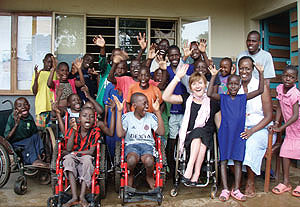June 9, 2009 - By Tracie White

Paralympian champion Cheri Blauwet worked on accessibility in Africa.
Paralympian wheelchair racer Cheri Blauwet learned early in her life the kind of qualities she wanted in a doctor.
'Even as a kid I had a lot of insight into what was going on with my body,' said Blauwet, 29, whose spinal cord was injured in a farming accident at 15 months old. 'I want a doctor to listen to me and trust me. To take an interest in me as a whole person.'
Those are the sorts of skills she learned in her studies at the School of Medicine, and she hopes to put them to work as a physician, starting in June. That's when she heads off to Boston to start an internship in internal medicine at Brigham and Women's Hospital followed by a three-year residency in physical medicine and rehabilitation at Spaulding Rehabilitation Hospital.
'Stanford has been amazing,' she said. 'It's given me a lot of autonomy to take the reins and run with it. It's how I see my professional life being shaped in the future. I want to continue to walk through new doors as they become open.
'At Stanford I was able to shape my career into exactly what I wanted it to be - dynamic and multidisciplinary, and with an outstanding education in the fundamentals of medicine.'
Blauwet, a paraplegic who has raced in 20 marathons, has won medals in sprinting and marathons at the Paralympics. There is little question that she is a trailblazer. She has traveled much of the world to remote spots where few wheelchairs have gone before, working for the rights of the disabled.
'I kind of shimmy in and close doors behind me and do some acrobatic moves and jump around a little bit,' said Blauwet explaining how she manages to drive almost any car, use public restrooms in remote locales and maneuver down alleyways in Third-World countries from Uganda to Argentina.
Blauwet made a recent trip to Africa so that she could participate in an investigation of how to improve wheelchair accessibility. 'It takes strength and agility to move in areas that lack ramps and pavement and accessible public buildings,' she said.
Blauwet's experience at Stanford, with the main campus as an 'incredible resource at our fingertips,' enabled her to pursue her varied interests and continue to strive for excellence, she said. It was possible, she added, to maintain a balance between studies and personal time - an emphasis on quality of life that many medical students appreciate.
'The importance of family, friendships and mentorship were always emphasized, which to me was invaluable,' she said.
Born and raised on a farm in Iowa, Blauwet attributes much of her success as an athlete and as an academic to both her family and the farming community she grew up in.
'All along they treated me just like the other kids,' she said. 'Good wheelchairs, good accessibility made it so that I could be a normal teenager.' She began racing in high school when she was recruited by her school's track and field coach then attended the University of Arizona where she was a member of the school's wheelchair racing team and graduated with a degree in molecular biology. She began her sporting career as a wheelchair sprinter, but later focused on long distances. Now retired from professional racing, she plans to focus full time on her career as a doctor.
About Stanford Medicine
Stanford Medicine is an integrated academic health system comprising the Stanford School of Medicine and adult and pediatric health care delivery systems. Together, they harness the full potential of biomedicine through collaborative research, education and clinical care for patients. For more information, please visit med.stanford.edu.